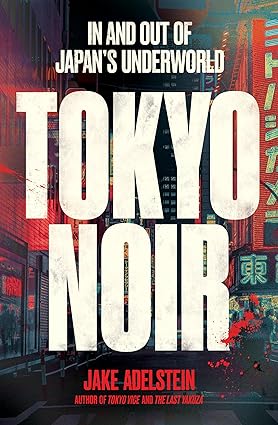Newsletters
Behind The Book Tokyo Noir With Jake Adelstein
New Information about Upcoming Book Related News
Behind The Book Tokyo Noir With Jake Adelstein
Back in May, I finished reading an early copy to the long-awaited sequel to Tokyo Vice titled Tokyo Noir by Jake Adelstein. I did one of my very first Q&As with Jake in 2022 and then last year I did a Behind The Book discussing The Last Yakuza and this time I am doing one discussing Tokyo Noir. Its hard to believe that two years have gone by since then. Where did the time go?
Q: Jake, for those who haven’t read Tokyo Noir, would you like to give a brief description of it?
A: Imagine Tokyo Vice got a little older, a little more cynical, and traded in late-night stakeouts for soul-searching while keeping a pack of cigarettes on hand. Tokyo Noir picks up after the Goto saga, but this time, it’s not just yakuza bosses and back-alley deals—it’s corporate corruption, North Korean money laundering, and the kind of due diligence that makes private investigation look like a walk in the park. Think of it as Tokyo Vice with a shot of reality and a chaser of existential dread. It’s still full of crime and chaos, but there’s also a healthy dose of “what the hell am I doing with my life?” It’s noir in the truest sense—dark, messy, and oddly personal, but with enough humor to keep the whiskey from getting too bitter.
Q: I read it took you 15 or 16 years to write Tokyo Noir. Why did it take so long to write and why is now the right time to publish it?
A: Well, if you’ve ever tried to write a book while dodging lawsuits, threats, and existential crises, you’ll understand why it took so long. Tokyo Noir wasn’t just a book to write—it was a life to live through. I got sidetracked by things like surviving, dealing with the collapse of the yakuza, and trying to figure out how to become a Buddhist priest without losing my mind. Every time I thought I was finished, something else would come up—another twist, another tragedy, another revelation about how deep the corruption really goes.
As for why now? It’s because the yakuza, as we know them, are fading out. What’s left is a new kind of darkness—corporate crime, bureaucratic indifference, and a post-yakuza Japan where the old rules don’t apply anymore. People are finally ready to see Tokyo for what it is: a city with as much moral ambiguity as neon lights. Plus, there’s only so long you can keep your publisher waiting before they start sending “friendly reminders.”
Q: I was honest in my review that I teared up a few times reading this, and I had to pray a ton of rosaries to get through some sad parts. Which parts were the most difficult to revisit?
A: I am touched that the book made you reach for your rosary.. The hardest parts? The chapters about friends who didn’t make it—people who were taken down by the world they were part of, or worse, by themselves. You get close to people, and when they’re gone, it’s like you’re left holding a piece of the wreckage. Rewriting those stories was like taking a blow to the gut repeatedly.
And then there’s the stuff about my own life. You know, there’s a point where you must look in the mirror and say, “Maybe I’m not the hero of this story after all.” Revisiting the toll this work took on my relationships, my sense of self—it wasn’t pretty. But it’s the truth. If I had to relive it, well, that did help me live better.
Q: What lessons do you want readers to learn after reading this book?
A: Honestly? Do get involved. Go ahead, dive into the muck. Sure, it’ll mess you up, but you’ll come out the other side spiritually richer for it. You’ll see things you never wanted to see, meet people you’d never want to sit next to at dinner, and question everything you thought you knew about the world. And that’s the reward. There’s something spiritually invigorating about knowing you didn’t just sit on the sidelines while the world turned to shit. You went in, got your hands dirty, and came back with a few scars—and a better understanding of how things really work.
You don’t gain much by staying in your bubble. When you get involved, you learn that the lines between good and bad, right and wrong, are thinner than you’d like. Even bad guys do good things. You realize that sometimes, the people you thought were the worst, aren’t that far from the people in power. And maybe, just maybe, you’ll find a weird kind of peace in the chaos. There’s nothing quite like staring down the abyss and realizing you’re still standing.

